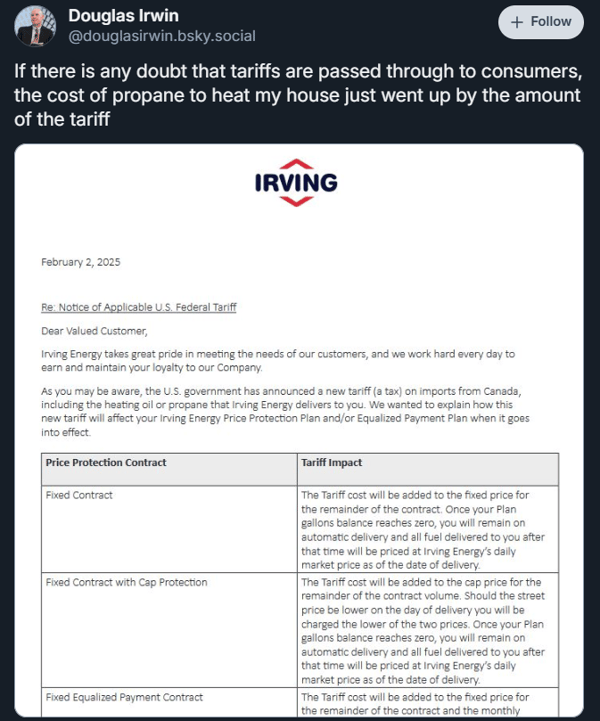Feds Forecast a Less Expensive Heating Oil Winter: What does that mean for state policies?
On October 6, the Federal Energy Information Administration (EIA) projected that heating your home with oil will...
Over the weekend, you may have read or heard that the Trump administration is going to impose new 25% tariffs on imported goods from Canada, Mexico, and China, effective on Tuesday. The depth and scope of how these tariffs will affect our economy and international relations is incredibly wide and deep. It will affect food, cars, lumber, and much more – and that’s before those countries retaliate by raising tariffs on things that we export. But with this blog, Green Energy Consumers will stay in our lane, meaning we will focus on the impacts of these tariffs on New England energy markets.
To cut to the chase – the tariffs are going to be painful for energy consumers in New England and will do nothing to advance a just transition from our overdependence on fossil fuels to clean energy. They will just hurt – for no reason that is apparent to any reputable economist or diplomat. According to the Boston Globe, about $10 billion worth of motor fuels, natural gas, and electricity is imported by New England from Canada each year, per stats provided by the New England-Canada Business Council. To break this down some, the Globe article shared these stats:

Irving Oil is also a major retailer of petroleum products in New England. For those of you who might be making purchases of gasoline, heating oil, or propane, economist Douglas Irwin posted this on BlueSky. We can assume that what Irving is saying below is indicative of the whole industry.

To emphasize how bad an idea these tariffs are, here’s what the conservative Wall Street Journal editorial board has to say:

Many of the EVs American drivers are purchasing are imported from Canada and Mexico. Popular vehicles like the Chevrolet Equinox EV and the Honda Prologue are assembled in Mexico, and many vehicles that are assembled in the US contain materials or parts that are sourced from Canada, Mexico, or China. This InsideEVs article has a list. We now know that the US and Mexico reached a deal to pause new tariffs for a month, but who knows how this will play out.
The impact of tariffs on EVs isn’t true just for EVs; car-marking is a global process, but anything that increases the price of EVs is going to slow the transition. And the tariff game goes two ways, of course. Canada just announced retaliatory tariffs, which will impact the American auto industry.
If you are not outraged by these tariffs, you should be. And you might be asking what you can do about it. No New England member of Congress is going to support what the president is doing. So, if you are so inclined, call the White House. The number is 202-456-1111. When we tried, we got a message that you can only talk to a person between 11 am and 3 pm, Tuesday through Thursday. The voicemail also directed us to www.whitehouse.gov/contact, but that webpage no longer exists. We were unable to find an alternative way of contacting the White House, so we will call back on Tuesday at 11 am. We invite you to join us.
On October 6, the Federal Energy Information Administration (EIA) projected that heating your home with oil will...
For those of us working on the clean energy transition, professionally or as volunteers, the last few months have...
Comments